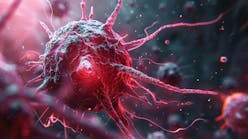An AI-powered pipeline for personalized cancer vaccines
Ludwig Cancer Research scientists have developed a full, start-to-finish computational pipeline that integrates multiple molecular and genetic analyses of tumors and the specific molecular targets of T cells and harnesses artificial intelligence algorithms to use its output to design personalized cancer vaccines for patients.
The design, validation and comparative assessment of this computational suite, NeoDisc, are detailed in the current issue of Nature Biotechnology in a publication led by Florian Huber and Michal Bassani-Sternberg of the Lausanne Branch of the Ludwig Institute for Cancer Research.
“NeoDisc can detect all these distinct types of tumor-specific antigens along with neoantigens, apply machine learning and rule-based algorithms to prioritize those most likely to elicit a T cell response, and then use that information to design a personalized cancer vaccine for the relevant patient,” said Huber.
NeoDisc additionally ranks the potential antigens it detects and generates visualizations of cancer cell heterogeneity within tumors.
“Notably, NeoDisc can also detect potential defects in the machinery of antigen presentation, alerting vaccine designers and clinicians to a key mechanism of immune evasion in tumors that can compromise the efficacy of immunotherapy,” said Bassani-Sternberg. “This can help them select patients for clinical studies who are likely to benefit from personalized immunotherapy, a capability that is also of great importance to optimizing patient care.”





